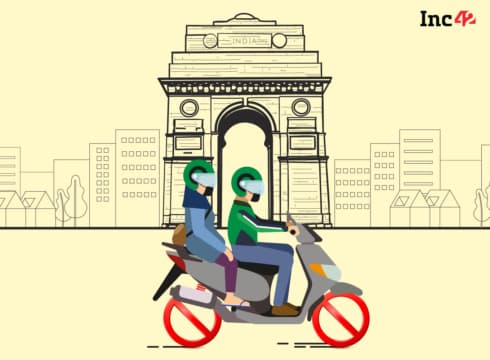Delhi government banned bike taxis on February 20, stating that they were violating the Motor Vehicle Act, 1988
People close to one of the aggregators who spoke with Inc42 said that there were no immediate plans to move to court
According to reports, the talks between the Delhi government and aggregators have broken down
Inc42 Daily Brief
Stay Ahead With Daily News & Analysis on India’s Tech & Startup Economy
Bike taxi aggregators are planning to move court within a week for a stay on the Delhi government’s February 20 bike taxi ban order.
The aggregators including the likes of Uber, Ola and Rapido, are looking to get a stay on the ban, Business Standard reported.
Delhi also happens to be the biggest market for bike taxis, with more than 120K drivers and as many as 2 Mn rides a week. Therefore, the ban has disrupted the service and last-mile connectivity that it brings. According to statistics shared by Uber with Inc42, Delhi saw more than 19 Lakh bike taxi rides between metro stations alone in 2022.
Delhi government, while notifying the ban two Mondays ago, noted that bike taxi drivers with non-transport registration numbers are carrying passengers in contravention of the Motor Vehicle Act, 1988.
BS reported today that the talks between the Delhi government and bike taxi aggregators and drivers have broken down. A senior executive of one of the aggregators told the publication that the state government would bring new guidelines in the next three to four months, even later, which leaves them with no choice but to move to court.
People close to one of the aggregators who spoke with Inc42 said that there were no immediate plans to move to court as of now, however.
Bone Of Contention Between Govt & Bike Taxi Aggregators
To be sure, bike taxi operators are also miffed about the electrification goals mentioned in Delhi’s draft aggregator policy, introduced in July 2022. According to Delhi’s draft aggregator policy, commercial two-wheeler aggregators have time till April 1, 2030, to convert to an all-electric fleet. However, for bike taxi aggregators, the same deadline is set for two years after the date of notification of the policy.
Further, every new vehicle boarded by a bike taxi aggregator needs to be electric after the Delhi government notifies the policy. The ecommerce two-wheeler aggregators have to only ensure 25% of the new vehicles they onboard are electric, conversely.
This discrepancy has left bike taxi aggregators feeling that Delhi’s policies reflect a bias against bike taxis. While food delivery is also a commercial activity, the Motor Vehicle act states that non-transport vehicles can’t be used to carry passengers for hire.
Electrification goals have since become a major point of contention, with Uber stating last month that Delhi’s electrification goals would ‘kill the industry as we know it’.
According to the aforementioned report, the aggregators have made two suggestions to break the impasse. The first was to offer to convert the fleet to electric as long as they had enough time. The second was to ensure a level playing field for all commercial two-wheeler riders, including those who deliver for ecommerce platforms.
{{#name}}{{name}}{{/name}}{{^name}}-{{/name}}
{{#description}}{{description}}...{{/description}}{{^description}}-{{/description}}
Note: We at Inc42 take our ethics very seriously. More information about it can be found here.


